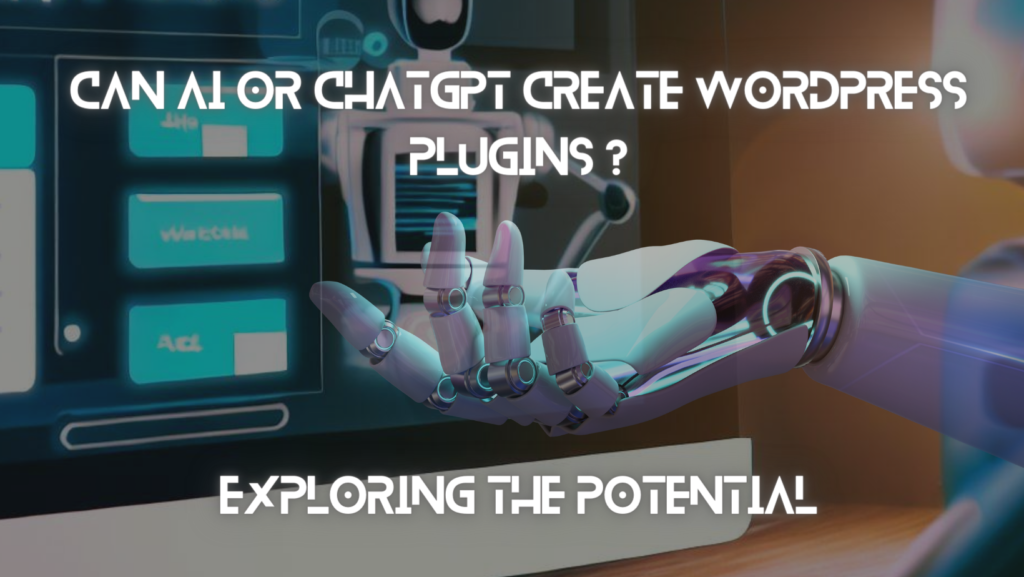Can AI or ChatGPT Create WordPress Plugins?
In the world of WordPress plugin development, the emergence of artificial intelligence (AI) and ChatGPT has sparked curiosity and raised an important question: Can AI or ChatGPT create WordPress plugins? This blog post delves into the potential of AI and ChatGPT in the realm of plugin development, exploring their capabilities, benefits, and considerations. Join us on this journey of discovery as we unravel the possibilities that AI and ChatGPT offer to enhance WordPress plugins and revolutionize the way we create and interact with these powerful website add-ons.
The Potential of AI in WordPress Plugin Development:
Artificial intelligence (AI) has transformed numerous industries, from healthcare to finance, and now it’s making waves in the realm of WordPress plugin development. With its ability to analyze data, automate tasks, and provide personalized experiences, AI holds tremendous promise for creating innovative and intelligent plugins.
One of the key areas where AI can revolutionize WordPress plugin development is in automation. AI-powered plugins can automate repetitive tasks, such as content generation, data analysis, and optimization, freeing up developers’ time and improving efficiency. This allows developers to focus on more strategic aspects of plugin creation, such as user experience and functionality enhancements.
Moreover, AI can enable intelligent recommendations and personalized content delivery within plugins. By leveraging AI algorithms, plugins can analyze user behavior, preferences, and historical data to offer tailored suggestions, related content, or even personalized user interfaces. This level of personalization enhances user engagement, satisfaction, and ultimately, the success of WordPress websites.
ChatGPT: Empowering Interactive Plugin Experiences:
One specific AI technology that has gained significant attention is ChatGPT. Powered by natural language processing (NLP) and machine learning, ChatGPT enables interactive and conversational experiences within WordPress plugins. It can understand and respond to user queries, facilitate dynamic interactions, and even generate human-like text.
Integrating ChatGPT into WordPress plugins opens up a world of possibilities. Imagine a plugin that can intelligently answer user questions, provide product recommendations based on natural language inputs, or assist users in navigating complex features. ChatGPT empowers developers to create intuitive and user-friendly plugins that can adapt and respond to user needs in real-time.
Benefits of AI-Driven WordPress Plugins:
The integration of AI in WordPress plugins brings a multitude of benefits for website owners, developers, and users alike. Let’s explore some of the key advantages:
1. Enhanced User Experiences: AI-powered plugins can provide personalized recommendations, adaptive interfaces, and tailored content, resulting in highly engaging and satisfying user experiences.
2. Automation and Efficiency: By automating repetitive tasks, AI reduces manual effort, saves time, and increases overall plugin development efficiency.
3. Intelligent Analytics and Insights: AI can analyze user data, behavior patterns, and preferences to generate valuable insights that inform decision-making and optimization strategies.
4. Improved User Engagement: AI-driven plugins can actively engage users through conversational interactions, intelligent notifications, and personalized feedback, fostering increased engagement and loyalty.
5. Dynamic Content Generation: With AI, plugins can dynamically generate content, such as blog post summaries, product descriptions, or personalized emails, reducing the burden on content creators.
Considerations in AI or ChatGPT for Plugin Development:
While the potential of AI in WordPress plugin development is promising, it’s important to address certain considerations and challenges.
1. Privacy and Data Security: AI-powered plugins often rely on user data for personalization. Ensuring data privacy, security, and compliance with relevant regulations is crucial to maintaining user trust.
2. Transparency and Explainability: Users should be aware of AI involvement in plugins and have a clear understanding of how their data is being used.
3. Ethical Use of AI: Responsible AI integration requires ethical considerations, including avoiding bias, ensuring fairness, and promoting inclusivity. Developers must be mindful of the potential societal impact of AI-powered plugins.
4. User Control and Consent: Providing users with control over their data and the ability to opt in or out of AI-driven features is essential. Transparency and clear consent mechanisms should be in place to empower users in their interactions with AI-powered plugins.
5. AI Limitations and Accuracy: While AI has made significant advancements, it still has limitations. Developers need to set realistic expectations regarding the capabilities and accuracy of AI-powered plugins and communicate them effectively to users.
The Future of AI in WordPress Plugin Development:
As AI technology continues to advance, the future of WordPress plugin development looks incredibly promising. Some potential areas of growth and innovation include:
1. Natural Language Understanding: AI-powered plugins may become even more adept at understanding and interpreting user queries, resulting in more accurate and relevant responses.
2. Image and Voice Recognition: Integration of AI-driven image and voice recognition technologies within plugins can open up new possibilities for visual and auditory interactions and functionalities.
3. Predictive Analytics: AI algorithms can analyze user data and patterns to predict user preferences, behavior, and trends, enabling proactive suggestions and personalized experiences.
4. Seamless Integrations: AI-powered plugins may seamlessly integrate with other platforms, APIs, and services, providing a holistic and cohesive user experience across different touchpoints.
Conclusion:
The potential of AI and ChatGPT in creating WordPress plugins is vast, offering enhanced user experiences, automation, and personalization. With AI-driven plugins, developers can create intelligent, adaptive, and dynamic solutions that cater to the ever-evolving needs of website owners and users. However, it’s crucial to address considerations such as privacy, transparency, and ethical use of AI. By embracing responsible AI practices, we can unlock the full potential of AI in WordPress plugin development and shape a future where intelligent, user-centric plugins drive innovation and user satisfaction.

